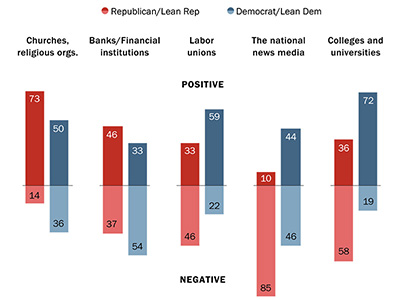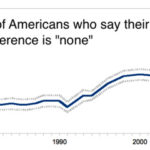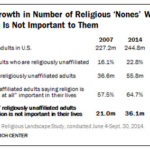WASHINGTON (RNS)—Do churches and other religious organizations have a positive impact on the way things are going in the United States? Americans are divided on that point, according to a Pew Research Center survey that shows they align along predictable party lines.
Overall, a majority of Americans (59 percent) see religion as a positive, compared to 26 percent who say it has a negative impact on the way things are going in the United States, according to Pew. Those numbers have held fairly steady in surveys since 2010.
 Graphic courtesy of Pew Research CenterNearly three-quarters (73 percent) of Republicans or those who lean Republican said churches and religious organizations have a positive impact, with 14 percent saying that impact is negative, according to Pew.
Graphic courtesy of Pew Research CenterNearly three-quarters (73 percent) of Republicans or those who lean Republican said churches and religious organizations have a positive impact, with 14 percent saying that impact is negative, according to Pew.
Meanwhile, Democrats are split: Half of those who are or lean Democrat believe religious institutions have a positive impact, according to the survey, while 36 percent said they have a negative impact.
Those divides become stronger as one’s political ideology becomes stronger, particularly among Democrats, according to the data.
Liberal Democrats are about as likely to say religious institutions have a negative impact on the way things are going in the United States (44 percent) as they are positive (40 percent). But more conservative and moderate Democrats said such organizations have a positive effect on the country (58 percent, compared to 29 percent who say it is negative).
A majority of all Republicans—75 percent of those who identify as conservative Republicans and Republican-leaning and 68 percent of those who are moderate and liberal Republicans—said religious institutions have a positive impact.
Religiously affiliated see value in institutions; Nones not so much
“While party plays a role, really what matters a great deal is people’s own religiosity and whether they belong to a denomination or not,” said Carroll Doherty, Pew’s director of political research.
Sign up for our weekly edition and get all our headlines in your inbox on Thursdays
White evangelical Protestant Christians were most likely (80 percent) to view religious institutions positively, along with majorities across Protestant and Catholic denominations, according to the study. Comparatively, Americans unaffiliated with a religion were more likely to say religious institutions had a negative (46 percent) impact than positive (34 percent).
Those views also were much more negative among Americans who never or seldom attend religious services and among those who have a postgraduate degree.
The Pew survey also found Republicans increasingly said colleges and universities have a negative impact on the nation (58 percent, up from 45 last year). Also, the partisan gap in views on the news media has widened, with 85 percent of Republicans reporting a negative view of the media’s effects, compared to 46 percent of Democrats.
Pew surveyed 2,504 American adults by phone between June 8-18. The margin of error for the survey overall is plus or minus 2.3 percentage points.
















We seek to connect God’s story and God’s people around the world. To learn more about God’s story, click here.
Send comments and feedback to Eric Black, our editor. For comments to be published, please specify “letter to the editor.” Maximum length for publication is 300 words.